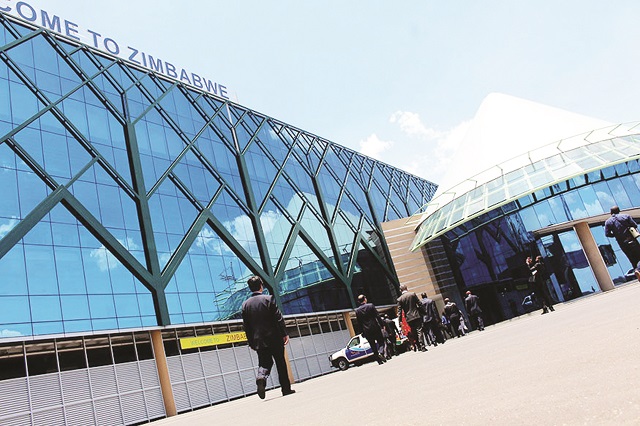China champions economic growth


The new look Victoria Falls international Airport was commissioned on Friday by president Mugabe. China provided the concessionary loan for the mega project to Zimbabwe through the China Exim Bank and tender was awarded to Jiangsu International, a Chinese firm
THOSE of us who studied development economics soon after independence will attest to the phenomenal and unprecedented development of the Asian economies, with particular reference to the Chinese economy.
We could also include India’s for good measure.
These two great Asian nations not only share common geographical borders: their economies are both less than three quarters of a century old, with India a shade older.
In 1980, China’s economy was only a toddler at age 30 years calculated as at October 1, 1949 when the Chinese Communist Party (CCP) declared the foundation of the People’s Republic of China. This was after a protracted and bruising war with Japan, a proxy of both the United States and Western Europe.
As we speak, most economies of Western Europe are more than 600 years old while that of the United States is half that age.
What makes a nation such as China, with a baby economy in comparable terms, prosper so rapidly?
It’s the policies of its leadership. When the CCP were fighting against Japan and her Western allies policies were already in place, beginning with the agrarian reforms.
The Chinese under Mao Zedong (Tsetung) did not fritter away precious time doodling and counting their fingers as to how the revolution would set in motion.
As indicated above, a whole regime of developmental policies, principal of which was the agrarian reform, were set in motion.
The policies were pervasive and inclusive as indicated by the one child per family policy.
This is an extra-ordinarily intelligent concept of economic planning.
The Chinese are a truly resilient and hardy race of people.
They believe in themselves and in what they do.
You cannot deter or cause them to veer off course.
Their detractors failed dismally in their attempts to scupper the CCP policy of one child per family by bringing into the equation the human rights factor.
Going by the current population statistics, China has 1,4 billion people thanks largely to this policy.
In 1985, the World Bank, the IMF and others began to proffer prognostications to the effect that the Chinese economy was set to leapfrog that of Japan, then the second largest economy in the world after the United States. That was the essence of the policy.
Its goals have been achieved and the policy has been set aside allowing the Chinese people to have more than one child per family. The Chinese are engineers through and through. The government is run by them; the technocrats in the strictest sense of the world.
This is unlike in the Western world where lawyers are the politicians. There is a difference here, subtle and even imperceptible to some and yet crystal to others depending on which side of the political divide one is on.
The West emphasise on political rights.
They extend monetary “aid”, invariably with strings attached, to their unalienable friends.
Usually such monies do not reach the “intended” beneficiaries because it is not intended for authentic and deserving beneficiaries but for the West’s surrogate governments.
Look at what has become of the Arab world with their Western-engineered Arab Spring? The world is literally on fire. It’s a conflagration worse than the two world wars.
That is on the one hand: on the other the Chinese are conspicuous by their absence in these ravaged and war-weary world spots.
The Chinese don’t go to foreign lands with guns blazing. Instead they go with development plans.
They empower the less endowed by economic development assistance.
Their emphasis of human rights is on economic development as opposed to political rights.
When the CCP assumed power in the late 1940s, an economic blue-print was laid out with a deliberate tilt towards heavy industry, in other words the accent was on exportable goods.
Wages were low, deliberately low, so as to be spread liberally across the board such as to cater for the nation’s small families. This links smack with the one child per family policy.
And this is what is called economic planning and development: and only engineers can excel at the feat.
Chinese heavy industry development has saturated the world, especially in Africa.
In the DRC for example, more than 6 000km of railway lines have been laid. Elsewhere, hospitals, schools, dams and so on have been constructed in consequence of which employment opportunities have been created for locals.
An annual growth rate of more than 10 percent has now contracted to less than eight percent. This is by deliberate planning. China’s economy is now inward-looking as concentration is more on the domestic front than on the export market.
This is a new phrase, a hysteresis between foreign investments and domestic investments.
This is sad news for the developing nations.
The Chinese are believers in showing and involving.
They have neither desire nor propensity to change the world, a progressive world at that free from war, hunger and starvation.
They do not believe in evanescent human rights as probated by the West.
Whenever the Chinese go in the world, they leave behind them an indelible structural presence: economic development.
Contrarily the western world of the capitalists leaves behind legacies of devastation, irreparably broken down economies and ungovernable states bursting at the seams with undetonated bombs which in turn require billions of US dollars to clear, money which has to be borrowed from you know who.
All this is having a negative impact on the economies of the developing world, plunging them even deeper into perennial recessions, ever ridden and asphyxiated by debts.
One would have thought that leaders of developing countries would have reached a stage where they look at the preserve of the West in their respective countries through the same pair of lenses instead of a diffracted prism in which each country chooses its own colour.
The developing nations are not seeing, or are misreading the anachronistic presence of the West in their respective countries.
The West is selling us fake economic blueprints through the auspices of the Bretton Woods institutions.
The continent south of the Sahara is a captive client, a guinea pig in the theatre of trial and error blueprints by the West.
At present the West, with respect to economic development cannot square up to China, India and the Tigers of the Far East. European economies in particular, have precious little to offer to the world but antediluvian theories of the Adam Smith era.
China is at the forefront of the pursuit and implementation of the world’s best champion of a socialist communist economy.
Detractors of Marx’s economic blueprints tell lies through the teeth that his policies have failed.
Otherwise how on earth could 110 of the cream of the western economists come together to produce a 647-page dictionary of Marxist thought?
China practises, the West theorises.
The difference is there for all to see. There is no economy in the West which boasts an annual growth rate of more than 3.5 percent.
Recently, the Europeans have warned against the danger of relying on Chinese exports to that continent.
As noted above, the Chinese are slowing down on exports to Europe.
They are now inward looking.
China does not seek to rule and subjugate the world unitarily as do the triple alliance (read unholy alliance) of NATO-EU-US.
The Chinese are not vindictive and retributive people as the Europeans and the Americans are.
If they were, Japan would not be the same today.
In fact, there would have been a Third World War, no doubt.
For years Japan humiliated and brutalised China on the behest of the US and Britain.
If the US and UK can have dependencies in far-away continents, why can China not have Hong Kong, Tibet, Macau and Taiwan with all of which she has cultural, religious and geographical connections?
As for us Zimbabweans, time has already run out to make choices.
We will continue to moan and play the giddy goat with ourselves very much at our own peril.
Why not put our money where our collective mouth is?
Since their Long March, the Chinese are marching.
The Chinese don’t bother when they are berated.
They are mailed by a very strong pachyderm.
They mind their own business.
Catch them if you will!










Comments